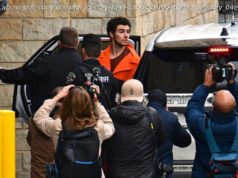Roger Federer’s wait for record-breaking title No. 8 at Wimbledon is over.
After Roger Federer closed out a Wimbledon final that was more of a coronation than a contest with an ace, he sat in his changeover chair and wiped away tears.
That is when it hit him: His wait for record-breaking No. 8 was over. Until then, Federer wasn’t focused on the notion of winning the grass-court tournament more often than any other man in the history of an event first held in 1877. All he’d been concerned with, consumed with, was being healthy enough to compete at a high level and, he hoped, to win a title, regardless of what the total count would be.
Capping a marvelous fortnight in which he never dropped a set, Federer won his eighth Wimbledon trophy and 19th Grand Slam championship overall by overwhelming Marin Cilic 6-3,6-1,6-4 in merely 1 hour, 41 minutes Sunday.
“Wimbledon was always my favorite tournament. Will always be my favorite tournament. My heroes walked the grounds here and walked the courts here. Because of them, I think I became a better player, too, ” said Federer, who will turn 36 next month and is the oldest male champion at the All England Club in the Open era, which began in 1968.
“To mark history here at Wimbledon really means a lot to me just because of all of that, really, ” he said. “It’s that simple.”
His first major title came at Wimbledon in 2003, and was followed by others in 2004,2005,2006 and 2007. He won again in 2009 and 2012. But then he lost finals in 2014 and 2015 to Novak Djokovic.
He couldn’t be sure another final, let alone title, was possible a year ago, when he lost in the semifinals, then took the rest of 2016 off to let his surgically repaired left knee heal.
“It’s been a long road, ” he said.
Sunday’s outcome was only in doubt for about 20 minutes, the amount of time it took Federer to grab his first lead.
Cilic said afterward he developed a painful blister on his left foot during his semifinal Friday, and that affected his ability to move properly or summon the intimidating serves that carried him to his lone Grand Slam title at the 2014 U. S. Open, where he surprisingly beat Federer in the semifinals.
This one was all Federer, who had been tied at seven championships with Pete Sampras and William Renshaw in what’s still officially called Gentlemen’s Singles. Sampras won all but one of his in the 1990s; Renshaw won each of his in the 1880s, when the previous year’s winner advanced automatically to the final.
With clouds overhead and a bit of chill in the air Sunday, Federer’s early play was symptomatic of jitters. For everything he’s accomplished, for all of the bright lights and big settings to which he’s become accustomed, the guy many have labeled the “GOAT” — Greatest of All Time — admits to feeling heavy legs and jumbled thoughts to this day.
It was Federer, not Cilic, who double-faulted in his first two service games. And it was Federer, not Cilic, who faced the initial break point, in the fourth game. But Cilic netted a return, beginning a run of 17 points in a row won by Federer on his serve. He would never be confronted with another break point.
“I gave it my best, ” Cilic said. “That’s all I could do.”
In the next game, Federer broke to lead 3-2. He broke again to take that set when Cilic double-faulted, walked to the changeover and slammed his racket. Cilic sat and covered his head with a white towel.
With Federer up 3-0 in the second set, Cilic cried while he was visited by a doctor and trainer. He said that was not so much a result of his foot’s pain as the idea that he could not play well enough to present a challenge.
“Very tough emotionally, ” said Cilic, whose foot was re-taped by a trainer after the second set. “I knew that I cannot give my best on the court.”
It might not have mattered. Federer was, as he’d been all tournament, flawless, the first man in 41 years to win Wimbledon without ceding a set. Against Cilic, he had 23 winners, only eight unforced errors.
This caps a remarkable reboot for Federer, who departed Wimbledon a year ago with a lot of doubts: His body was letting him down for the first time in his career. He skipped the Rio Olympics, the U. S. Open and everything else in an attempt to try to get healthy.
It worked. And how.
Feeling refreshed and fully fit, Federer returned to the tour in January and was suddenly playing like the guy of old, rather than like an old guy.
In a turn-back-the-clock moment, he faced rival Rafael Nadal in the Australian Open final and, with a fifth-set comeback, won. It was Federer’s 18th Grand Slam title, adding to his own record, and first in 4½ years. Those who had written Federer off needed to grab their erasers.
The formula made sense, clearly, so why not try it again? Federer skipped this year’s clay-court circuit to be in top shape for the grass courts he loves so dearly. Sunday’s victory made Federer 31-2 in 2017, with a tour-leading five titles.
“On one side, yes, it surprises me. On the other side, I know he’s able to do so many things. So it’s not surprising, ” coach Severin Luthi said. “But when it happens, it’s amazing.”
Yes, Federer is back to being supreme in tennis, lording over the sport the way no man has.
He’s not, of course, the same 21-year-old kid who had a ponytail and scruff when he beat Mark Philippoussis in the 2003 Wimbledon final. Or the teen who, two years earlier, beat Sampras himself at Centre Court in the fourth round, their only tour-level meeting.
Federer’s hair is cropped, his face clean shaven. He’s a father of four, and both sets of twins — boys, 3, in their light blue blazers; girls, 7, in their dresses — were in the guest box for Sunday’s trophy ceremony.
One son stuck a couple of fingers in his mouth until a sister grabbed his hand.
“They have no clue what’s going on. They think it’s probably a nice view and a nice playground. But it’s not quite like that here, so one day, hopefully, they’ll understand, ” Federer said about his boys.






